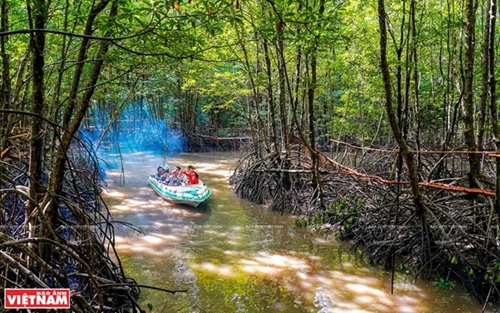Vice Chairman of the provincial People’s Committee Tran Hong Quan said that as one of the four localities in the Mekong Delta key economic region, Ca Mau boasts a world biosphere reserve associated with the Ca Mau Cape National Park, and the U Minh Ha National Park, which offer opportunities for developing eco-tourism.
    |
 |
|
Tourists experience mangrove forest ecosystem in Ca Mau. (Photo: Vietnam Pictorial) |
The Ca Mau Park was added to a list of wetlands of international importance in 2012, becoming the 2,088th of its kind in the world and the fifth in Vietnam, with a large area of intertidal mudflats and submerged forests. It is the only place in Vietnam with three sides bordering the sea and where two different tidal regimes interact, which contributes to building new mudflats and creating favorable habitats for many species.
The site also provides important stopover and wintering habitats for a large number of water birds. In 2010, the International Union for the Conservation of Nature (IUCN) recorded many globally-endangered species in the area, including primates, birds, otters, reptiles, and fishes.
Along with freshwater and mangrove forest ecosystems, Ca Mau also has humanities-based tourism products with national and provincial historical and cultural relic sites.
Deputy Director of the provincial Department of Culture, Sports and Tourism Tieu Minh Tien said that local cultural features such as “don ca tai tu” (southern amateur singing), “gac keo ong” (apiculture in the wild), and a number of food specialties contribute to attracting visitors.
A species of crab in Nam Can district and a fermented fish hot pot in the U Minh Forest are in the list of the Top 100 specialties in Vietnam in 2020-2021 by the Vietnam Record Organization (Vietkings).
Ca Mau dried shrimp and U Minh honey, meanwhile, are also among the Top 100 Vietnamese specialty gifts.
Source: VNA